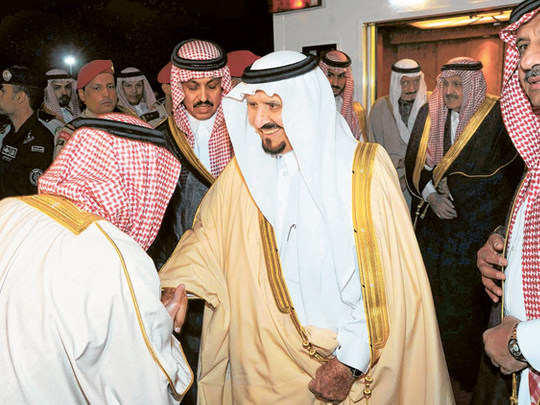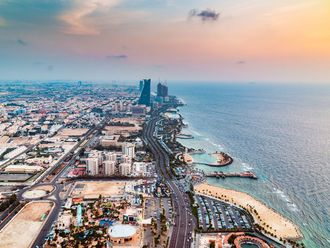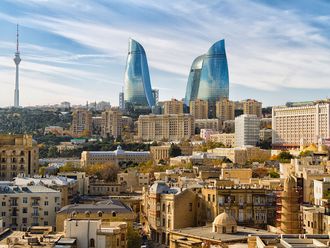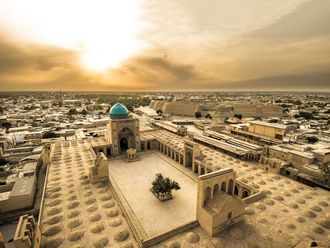
Riyadh: King Abdullah Bin Abdul Aziz of Saudi Arabia is on his way to the United States for medical checks for a back ailment.
Remarkably, the Saudi monarch ordered that four medical bulletins be issued concerning his condition in the space of a single week, which further highlighted his desire to be transparent and dispel rumours.
Still, what preoccupied observers was the return of Crown Prince Sultan Bin Abdul Aziz Al Saud from extended holidays in Agadir, Morocco, which was clearly meant to prevent a putative power vacuum in the kingdom.
Contemporary Saudi rulers earned their popular bay'has (allegiances) and continued to be accountable to key constituencies, by ‘modernising' the system that aspired to be as transparent as a monarchy could be, while meeting tribal and customary obligations.
Despite the ‘family enterprise' epithet that presumes that the kingdom is run in old-fashioned ways, the ruling family enjoys a hold on power at various levels. Unlike their European counterparts, whose monarchical contributions have virtually been exhausted, the agile — even if ageing — Saudi ruling family managed the actual workings of this system with relative gusto.
Pledge of allegiance
With a new committee named Hay'at Al Bay'ah [Allegiance Commission], King Abdullah underscored the necessity to pledge allegiance to Al Saud. Although this new mechanism inspired observers to conclude that this was vintage King Abdullah, in reality the new law was nothing more than a new Succession Law. In fact, the confusion arose because one law pledged allegiance to something or someone, whereas this new law introduced his long-anticipated reforms to the kingdom's succession mechanism. With 25 articles defining its purposes, the ‘Allegiance Law of Succession' replaced the informal family gathering that selected and approved successors, though secret deliberations were not excluded. The Commission is chaired by the oldest surviving son of the founder, Prince Misha'al, and includes sons and grandsons of the founder.
Though few appreciated its repercussions at the time, Prince Nayef Bin Abdul Aziz's appointment as Second Deputy Prime Minister in March 2009, clarified what role(s) this commission may be called to play. If members rejected a nominated heir, or called for an alternative vote for one of three leaders designated by the ruler, all bets were off as far as an enthronement was concerned.
Strict timetable
Moreover, the appointment of a new heir was further placed within a strict timetable, within 30 days of the accession of a new monarch, even if few anticipated lengthy deliberations given the secret nature of all decision-making mechanisms.
To prevent nasty surprises, King Abdullah foresaw the need for a Transitory Ruling Council composed of five members of the institution, who would assume responsibilities for state affairs for a maximum period of one week, if neither the monarch nor his heir were fit to rule. This idea was amply relevant given the advanced ages of the current leaders and the potential for disagreements within the house of Al Saud.
Importantly, the Transitory Ruling Council would not enjoy prerogatives affecting state institutions, such as dissolving the government or the country's self-styled Consultative Council (parliament), the Majlis Al Shurah, nor would it be allowed to amend the Basic Law or any laws that were linked to the system of rulership.
In other words, King Abdullah ensured that no one outside the family would contemplate recommending non-Al Saud names for the post, which was a specifically defined and strictly protected entitlement.
Moreover, by institutionalising the process, the ruler etched in stone what was also largely guaranteed, namely that only sons and grandsons of Abdul Aziz would accede to the Saudi throne. Not only was this a turning point for Riyadh but, equally revelatory, it placed King Abdullah's cachet on succession matters by actually strengthening the ruling family.
Critics of the octogenarian monarch recognised his promotion of social reforms, but insisted that whatever political changes were introduced were cosmetic, and largely inconsequential. Royal rule, many posited, remained as absolute as ever.
- Dr Joseph A. Kechichian is an author, most recently of ‘Faysal: Saudi Arabia's King for All Seasons' (2008).












